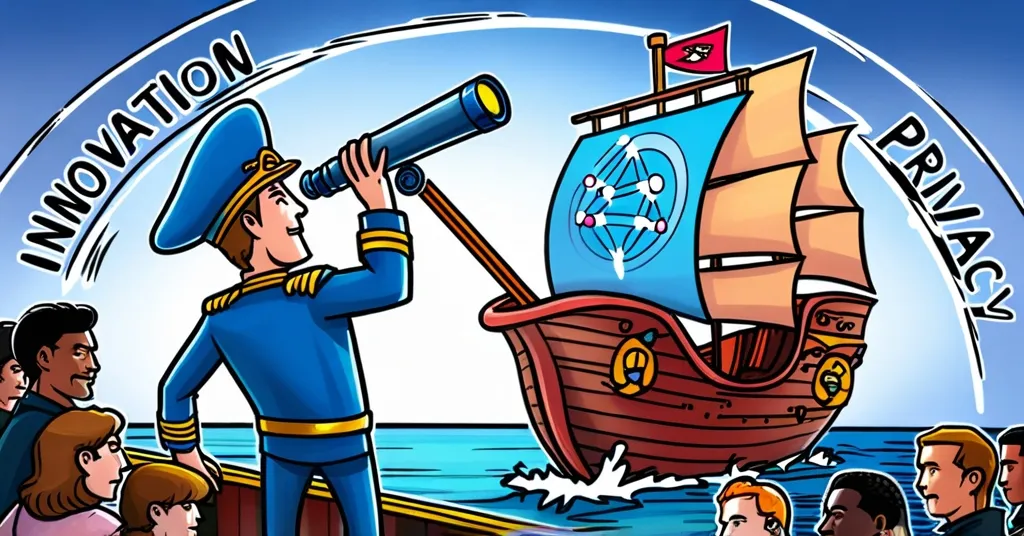Vitalik Buterin Unveils Ethereum Foundation’s Leadership Restructuring Goals

Vitalik Buterin Announces Ethereum Foundation’s Leadership Overhaul to Boost Innovation and Neutrality
Vitalik Buterin, the visionary behind Ethereum, has revealed on X that the Ethereum Foundation (EF) is undergoing a significant leadership restructuring. This strategic move is designed to meet five critical goals, enhancing Ethereum’s position as a leader in the blockchain space.
- Enhance technical expertise
- Boost communication with users and developers
- Attract fresh talent
- Support app builders
- Promote decentralized and privacy-centric technologies
The Ethereum Foundation isn’t just shuffling the deck; they’re bringing in a whole new set of cards to the table. The first goal is to bolster technical expertise at the top. This isn’t about hiring more coders but ensuring the leadership has the skills to navigate future challenges. Think of it as upgrading the ship’s captain with a better telescope to spot the icebergs ahead.
Next, the EF aims to supercharge communication with the Ethereum community. In a space where every tweet can spark a revolution, clear and open dialogue is crucial. They’re not just talking to the choir but engaging with the entire congregation—users, developers, and everyone in between.
Buterin is also on a mission to inject fresh blood into the ecosystem. The crypto world moves at breakneck speed, and staying ahead means constantly refreshing the talent pool. It’s not just about filling seats; it’s about bringing in new ideas and energy to keep Ethereum at the forefront of innovation.
App builders, the unsung heroes of the blockchain world, are getting a major boost. The EF plans to ramp up support, ensuring these innovators have the tools and resources they need. Imagine a world where developers can easily turn their blueprints into skyscrapers—that’s the kind of support the EF is aiming to provide.
Finally, the EF is doubling down on its commitment to decentralization and privacy. In an era where these values are under constant threat, Buterin’s push for technologies that protect users’ rights is more relevant than ever. He’s clear about using tools within the Ethereum ecosystem, even if it means bending the rules of neutrality a bit:
“I think that EF should be more willing to use tools built in the ecosystem (including in decentralized finance) even if it means we’re not entirely neutral in that sense. Though we should of course do this very judiciously.”
Decentralized finance, or DeFi, refers to a financial system built on blockchain technology that operates without central financial intermediaries. By using DeFi tools, the EF can demonstrate support for the platform’s development and utility, showing that Ethereum is more than just a blockchain—it’s a thriving ecosystem.
But while Buterin is open to using internal tools, he’s drawing a hard line at lobbying:
“These things aren’t what EF does and this isn’t going to change. People seeking a different vision are welcome to start their own organizations.”
This stance underscores Ethereum’s commitment to maintaining global neutrality, defined as an independent stance from any country or political entity. It’s a reminder that Ethereum’s mission is to serve the world, not just a select few.
The restructuring has been in the works for nearly a year, a testament to the EF’s dedication to getting it right. As Ethereum continues to evolve, these changes signal a new era of growth and innovation, but they also highlight the challenges ahead. Balancing technical prowess with community engagement, all while staying true to the principles of decentralization and privacy, is no small feat.
And let’s not forget the elephant in the room: Bitcoin. While Ethereum pushes forward with its ambitious goals, Bitcoin remains the king of cryptocurrencies. Ethereum’s focus on smart contracts and decentralized apps fills a niche that Bitcoin, with its laser focus on being digital gold, doesn’t aim to serve. Smart contracts are self-executing contracts with the terms directly written into code, allowing for automated and trustless transactions. But the competition is fierce, and Ethereum’s success will depend on its ability to execute on these new goals.
From a Bitcoin maximalist perspective, these changes might be seen as Ethereum’s attempt to catch up. A prominent Bitcoin advocate once remarked, “Ethereum’s constant tinkering with its structure shows it’s still searching for its identity, while Bitcoin’s simplicity is its strength.” This view underscores the ongoing debate between the two giants of the crypto world.
The concept of effective accelerationism, or e/acc, also comes into play here. Ethereum’s push for rapid innovation aligns with the e/acc philosophy of accelerating technological progress to bring about societal change. By embracing new technologies and ideas, Ethereum is not just keeping pace but actively pushing the boundaries of what’s possible in the blockchain space.
Despite these ambitious goals, there are potential challenges and risks. Enhancing technical expertise might be easier said than done, especially in areas like scalability and security. Improved communication is essential, but past challenges, such as misunderstandings around Ethereum’s roadmap, show the difficulty of managing a diverse and passionate community. And while promoting decentralization and privacy is noble, it could face resistance from those who prefer more centralized control.
So, what are the key takeaways from these changes?
- What are the five primary goals of the Ethereum Foundation’s leadership restructuring?
The five primary goals are improving technical expertise, enhancing communication with users and developers, attracting fresh talent, supporting app builders, and promoting decentralized and privacy-centric technologies.
- Why does Vitalik Buterin believe the Ethereum Foundation should use tools built within the Ethereum ecosystem?
Buterin believes using internal tools, including those in decentralized finance, supports the platform’s development and utility, even if it means the organization isn’t entirely neutral.
- What activities does Vitalik Buterin warn against, and why?
Buterin warns against lobbying regulators and political figures, as it could compromise Ethereum’s global neutrality. He encourages those with different visions to start their own organizations.
As Ethereum gears up for this new chapter, the crypto community watches with bated breath. Will these changes propel Ethereum to new heights, or will they be just another footnote in the saga of blockchain innovation? Only time will tell, but one thing’s for sure: the journey is going to be anything but boring.



